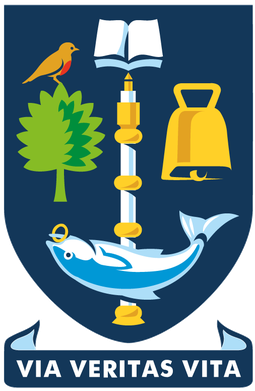
The University of Glasgow is a public research university in Glasgow, Scotland. Founded by papal bull in 1451 [O.S. 1450], it is the fourth-oldest university in the English-speaking world and one of Scotland's four ancient universities. Along with the universities of St Andrews, Aberdeen, and Edinburgh, the university was part of the Scottish Enlightenment during the 18th century. Glasgow is the largest university in Scotland by total enrolment and, with over 15,900 postgraduates, the fifth-largest in the United Kingdom by postgraduate enrolment.

Sheffield Hallam University (SHU) is a public research university in Sheffield, South Yorkshire, England. The university is based on two sites; the City Campus is located in the city centre near Sheffield railway station, while the Collegiate Crescent Campus is about two miles away in the Broomhall Estate off Ecclesall Road in south-west Sheffield. A third campus at Brent Cross Town in the London Borough of Barnet is expected to open for the 2025–26 academic year.

Hull York Medical School (HYMS) is a medical school in England which took its first intake of students in 2003. It was opened as a part of the British government's attempts to train more doctors, along with Brighton and Sussex Medical School, Peninsula Medical School and University of East Anglia Medical School. It is the joint medical school of the Universities Hull and York. The University of Hull was rated Gold in the Teaching Excellence Framework 2023 as was the University of York. The latter is also a member of the Russell Group; an association of 24 world class, research intensive universities.
The Carstairs index is an index of deprivation used in spatial epidemiology to identify Socio-economic confounding.
The Glasgow Clinical Trials Unit (CTU) is a collaborative research establishment in Glasgow, Scotland. It comprises the Glasgow Clinical Research Facility, the Robertson Centre for Biostatistics and Greater Glasgow and Clyde NHS R&D division.
Diploma in Tropical Medicine and Hygiene (DTM&H) is a postgraduate award, given after a prescribed period of instruction followed by an examination consisting of three parts; (a) a written examination (b) a practical laboratory examination and (c) an oral examination. In some schools, a fourth part consisting of a clinical bedside examination may be required.
Dame Anna Felicja Dominiczak is a Polish-born British medical researcher, Regius Professor of Medicine - the first woman to hold this position, and the Chief Scientist (Health) for the Scottish Government. From 2010 to 2020, Dominiczak was the Vice-Principal and Head of the College of Medical, Veterinary and Life Sciences at the University of Glasgow, Scotland. She is an Honorary Consultant Physician and Endocrinologist for the NHS Greater Glasgow and Clyde Health Board, and Health Innovation Champion for the Medical Research Council. From 2013 to 2015, Dominiczak was president of the European Society of Hypertension. She is the current Editor-in-Chief of Precision Medicine, a new journal launched in July 2023.
The National Institute for Health and Care Research (NIHR) is the British government's major funder of clinical, public health, social care and translational research. With a budget of over £1.2 billion in 2020–21, its mission is to "improve the health and wealth of the nation through research". The NIHR was established in 2006 under the government's Best Research for Best Health strategy, and is funded by the Department of Health and Social Care. As a research funder and research partner of the NHS, public health and social care, the NIHR complements the work of the Medical Research Council. NIHR focuses on translational research, clinical research and applied health and social care research.

The UCL Great Ormond Street Institute of Child Health (ICH) is an academic department of the Faculty of Population Health Sciences of University College London (UCL) and is located in London, United Kingdom. It was founded in 1946 and together with its clinical partner Great Ormond Street Hospital (GOSH), forms the largest concentration of children's health research in Europe. In 1996 the Institute merged with University College London. Current research focusses on broad biomedical topics within child health, ranging from developmental biology, to genetics, to immunology and epidemiology.

Ian Ford is a Scottish doctor who is a professor of biostatistics and a director of the Robertson Centre for Biostatistics, and a former Dean of Faculty of Information and Mathematical Sciences, at the University of Glasgow.

Murray G. H. Pittock MAE FRSE is a Scottish historian, Bradley Professor of Literature at the University of Glasgow and Pro Vice Principal at the University, where he has served in senior roles including Dean and Vice Principal since 2008. He led for the University on the University/City of Glasgow/National Library of Scotland Kelvin Hall development (kelvinhall.org.uk), and has chaired Glasgow's unique early career development programme, which has been highly influential in the sector, since 2016. He has also acted as lead or co-lead for a range of national and International partnerships, including with the Smithsonian Institution, and plays a leading role in the University's engagement with government and the cultural and creative industries (CCIs), organizing the 'Glasgow and Dublin: Creative Cities' summit in the British Embassy in Dublin in 2019, and working with the European network CIVIS on the creation of a European policy document on universities and civic engagement, on which he gave a masterclass for La Sapienza University He also produced a major report on the impact of Robert Burns on the Scottish Economy for the Scottish Government in 2020; a Parliamentary debate was held at Holyrood on the recommendations, which have been cited in policy debate many times since. In 2022, he was declared Scotland's Knowledge Exchange Champion of the year. Outside the University, he served on the Research Excellence Framework (REF) Institutional Environment Pilot Panel in 2018-22, and on the National Trust for Scotland Board (2019-27) and Investment Committee, as well as acting as Co-chair of the Scottish Arts and Humanities Alliance (SAHA) and chair of the Governance Board of the Scottish Council on Global Affairs. He also serves as Scottish History Adviser to the NTS and as an adviser to a wide range of other national heritage bodies and the Scottish Parliament; recently he has provided expert advice to both the Scottish and British parliaments on promoting Scotland abroad, and serves on the Scottish Government's Scottish Connections Advisory Panel on the diaspora. He is on the Advisory Board of NISE, the Europe-wide research group bringing together over 40 research centres working on national identities and was President of the Edinburgh Walter Scott Club in 2019-20 and 2021-22. He has given a number of major lectures, most recently the Magnusson, MacCormack and Caledonian lectures

Sheila Macdonald Bird OBE FRSE FMedSci is a Scottish biostatistician whose assessment of misuse of statistics in the British Medical Journal (BMJ) and BMJ series ‘Statistics in Question’ led to statistical guidelines for contributors to medical journals. Bird's doctoral work on non-proportional hazards in breast cancer found application in organ transplantation where beneficial matching was the basis for UK's allocation of cadaveric kidneys for a decade. Bird led the Medical Research Council (MRC) Biostatistical Initiative in support of AIDS/HIV studies in Scotland, as part of which Dr A. Graham Bird and she pioneered Willing Anonymous HIV Surveillance (WASH) studies in prisons. Her work with Cooper on UK dietary bovine spongiform encephalopathy (BSE) exposure revealed that the 1940–69 birth cohort was the most exposed and implied age-dependency in susceptibility to clinical vCJD progression from dietary BSE exposure since most vCJD cases were younger, born in 1970–89. Bird also designed the European Union's robust surveillance for transmissible spongiform encephalopathies in sheep which revolutionised the understanding of scrapie.
Mark J. Millan is a neuroscientist specialising in the study and improved treatment of disorders of brain. He was the Director of Pharmacological Innovation for the Central Nervous System (CNS) at the Institut de Recherché de Servier (IDRS) in Paris, France. He also served as the Secretary of the European College of Neuropsychopharmacology. Currently he is a visiting professor in the School of Psychology and Neuroscience at the University of Glasgow. Born in Edinburgh, he is the son of former Scottish Labour Party Leader and European Commissioner, Bruce Millan. He studied at Cambridge University and then spent ten years at the Max Planck Institute of Psychiatry, Munich, before moving to Paris.

The Beatson Institute for Cancer Research is a biological research facility that conducts research into the basic biology of cancer. It is based in Glasgow, Scotland.
The University of Dundee School of Medicine is the school concerned with medical education and clinical research at the University of Dundee in Scotland. In 1967, Dundee's medical school became independent in its own right having started in 1889 as a joint venture between the University of St Andrews and University College Dundee. In 1974 the medical school moved to a large teaching facility based at Ninewells Hospital in the west of Dundee. The School of Medicine now encompasses undergraduate, postgraduate, specialist teaching centres and four research divisions.
Ronan Lyons OBE FFPH FFPHMI FLSW is the inaugural Clinical Professor of Public Health at Swansea University Medical School. He is Director of the National Centre for Population Health and Wellbeing Research (NCPHWR), Director of the Farr Institute Centre for the Improvement of Population Health through E-records Research (CIPHER), Co-director of the Secure Anonymised Information Linkage (SAIL) system, co-director of the Centre for the Development and Evaluation of Complex Interventions for Public Health Improvement (DECIPHer), and co-director of the Administrative Data Research Centre Wales.
Helen Minnis is a Professor of Child and Adolescent Psychiatry at the University of Glasgow. She studies reactive attachment disorder and other developmental conditions.
Norna Robertson is a lead scientist at LIGO at California Institute of Technology, and professor of experimental physics at the University of Glasgow. Her career has focused on experimental research into suspension systems and instrumentation to achieve the detection of gravitational waves.
Jennifer Smith is a sociolinguistic specialist in language variation and dialects, especially Scottish dialects across the generations and geography of Scotland, including developing the Scottish syntax atlas which analyses the diversity. Her research also covers variations in colonial English, for example, in North America. Professor of sociolinguistics at the University of Glasgow School of Critical Studies, she teaches and researches language and variation theory.

Michael Barrett is Professor of Biochemical Parasitology at the University of Glasgow. His research focuses on understanding how drugs work against parasites and how parasites become resistant to drugs. He is also Director of Glasgow Polyomics, a facility specialising in genomic, proteomic and metabolomic technologies, and directs the Scottish Universities Life Sciences Alliance (SULSA). Barrett advises several international organisations on issues surrounding drug development and resistance, including the World Health Organization (WHO) where he is part of the expert group on human African trypanosomiasis and the Drugs for Neglected Diseases initiative (DNDi).










